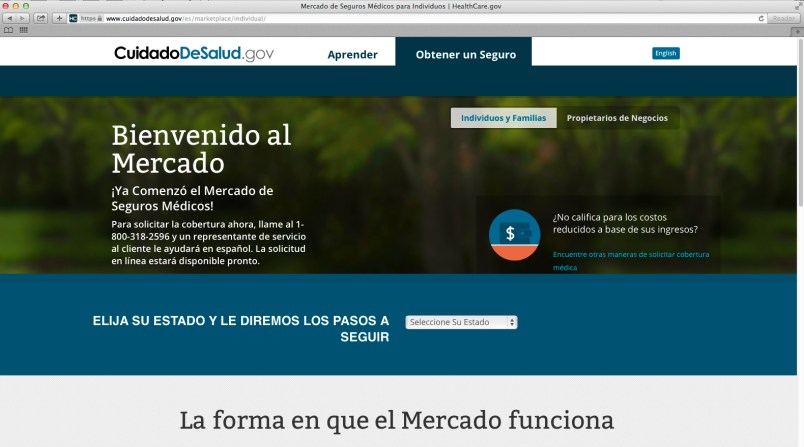Despite the road bumps and hurdles encountered last year during the first open enrollment period, the numbers show the Affordable Care Act was a success: 7.3 million enrollees and counting. But not everyone who sought to enroll was able to do so. Limited English speakers and immigrants faced major uphill battles that, without action in the next few weeks, threaten to hold them back again from enrolling come Nov. 15.
One continuing challenge is the dearth of resources for consumers who speak languages other than English. The federal Marketplace call center did not — and still doesn’t — have a single bilingual Asian-language speaker, and it employed a limited number of Spanish bilingual operators. This is a problem, considering one in three Asian Americans have a limited ability to read, write, speak or understand English. Many callers speaking Chinese or Vietnamese, two of the most commonly spoken languages in the U.S. besides Spanish, experienced frustration with the call center during the first enrollment period.
And when limited English speakers tried to enroll at Healthcare.gov, they were met with a website that was only functionally available in English and Spanish. The few educational resources available in Asian languages at the federal Marketplace were flawed by translation errors and too hard to read. One factsheet contained Korean phonetic translations of health insurance terms that lacked any real meaning.
In New York, where there are over 200,000 Korean Americans in the New York City area alone, the state provided merely one flyer in Korean. That flyer was so poorly done that advocates couldn’t distribute it. The Korean characters were incorrectly spaced and the translations of English terms were completely meaningless. Even in California, one of the few states to commit resources for languages other than English and Spanish, translated materials were often too technical for the average consumer to understand.
One way advocates and enrollment assisters worked around these challenges was by providing in-language, in-person assistance. Yet a high level of coordination and creative resource-sharing was needed to maximize these efforts. Collaborations such as Action for Health Justice, of which my organization is a member, leveraged the expertise of on-the-ground health centers and community organizations to reach and enroll immigrant and limited English-speaking Asian Americans, Native Hawaiians, and Pacific Islanders who otherwise would have been left out.
Asian Health Services (AHS) in Oakland, CA, for example, served many individuals and families who would never have gotten covered without this help. Their clients included people like Mai*, a Chinese-American single mom who has trouble navigating complex materials in English. When her employer ended health care coverage, she turned to a trusted community provider to get covered and get connected to a doctor. Without AHS, she would have been left to navigate enrollment by herself, a daunting task for anyone and particularly for someone who does not speak English very well.
Stories like Mai were the norm for those trying to enroll Asian and Pacific Islander-language speakers and immigrants. In-person assisters spent hours walking clients though the ins and outs of the application, explaining complicated insurance terms and helping them select a plan. Despite the challenges, groups like AHS show that reaching the perceived hardest-to-reach is possible. At the same time, assisters will be heavily tapped in round two and the need far outpaces available resources. The Department of Health and Human Services’ recent funding announcement, which gives credence to their value, provides only $60 million to Navigators serving residents in over 30 states, a far cry from what is needed.
The past is about to repeat itself in the next few weeks because despite persistent advocacy, little has changed at the federal and state levels when it comes to minority outreach. Even the latest round of notices sent to consumers who needed to verify their immigration status were sent only in English and Spanish. And the in-language taglines contained in the notices were far from adequate enough for the average non-English speaker to understand its importance and the fact that their coverage would be cut off without a response.
Federal and state policymakers have their work cut out for them as Nov. 15 approaches. Now is the time to tweak Marketplace policies and systems to ensure they are actually accessible for all consumers — regardless of what language they speak. Without a change at all levels, eligible Americans stand to lose out on the promise of affordable, quality health care.
Priscilla Huang is senior director of impact strategies at the Asian & Pacific Islander American Health Forum, a member of Action for Health Justice (AHJ). AHJ is a coalition composed of national organizations and 70 community based organizations outreaching to, educating and enrolling Asian Americans, Native Hawaiians and Pacific Islanders in the Affordable Care Act.
*Mai is a pseudonym used to project the client’s identity.






